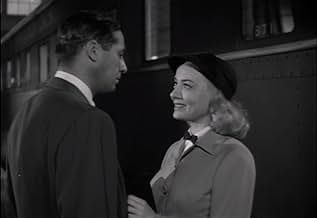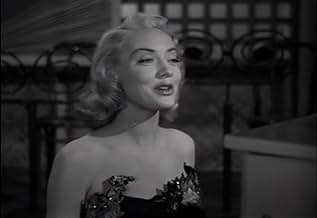Ajouter une intrigue dans votre langueDuring the 1950s, a small-town newspaper editor and a state assistant attorney-general fight corrupt local officials from one rotten county.During the 1950s, a small-town newspaper editor and a state assistant attorney-general fight corrupt local officials from one rotten county.During the 1950s, a small-town newspaper editor and a state assistant attorney-general fight corrupt local officials from one rotten county.
- Réalisation
- Scénario
- Casting principal
- Bailiff
- (as Bob Stephenson)
Avis à la une
An editor from a mid-sized city (Pidgeon), visiting his daughter's family in a neighboring county, drives into a speed trap. He's thrown into jail, subjected to a prisoners' kangaroo court, and fined the entire contents of his wallet. Once back, he launches a crusade against this hijacking of the law, lining up witnesses and publishing blistering editorials against Gomez, the sheriff, and county boss Sloane. Then, abruptly, he leaves town and the campaign ceases.
A prosecutor from the state capital (Hodiak) is sent to investigate; upon arrival, he's ambushed by a B-girl and shantoozie (Totter) who works at the machine's headquarters, a road house called Amboy's. Her philosophy of life is eloquent: (`Who makes plans? You do the best you can - Sometimes you wish things turned out differently.') But she grows sweet on him and warns him off. With the help of honest cop Malden, Hodiak tries to get to the bottom of the editor's silence, but everywhere encounters a stone wall. It turns out that the corruption runs very close to home....
Probably the biggest shortcoming of The Sellout is relegating Totter to a sub-plot that fizzles out too early; she lends the movie whatever quirky subversiveness it shows. For the most part, however, it's four-square - there's little visual excitement - and a little too self-important. Though crowded with incident, it ends up just plodding along. It's also rooted in a now (one hopes) vanished America where out in the boondocks, away from the bright lights of civilization, lurked pockets of unexpected peril. The billboards marking the city limits might have well warned: Beyond here lie monsters.
Newspaper editor Walter Pigeon and a friend Whit Bissell get caught up in a speedtrap in the rural part of the county they reside in. Given the Code was in place in 1951, I'm sure they would have been brutalized far more graphically in the jail of Thomas Gomez the corrupt sheriff of the county. Still and all it's enough to fill Pigeon with a firm resolve to get Gomez. Even without the help of local prosecutor Cameron Mitchell who is Pigeon's son-in-law.
But a crusading special prosecutor from the State Attorney General and an honest city cop played by John Hodiak and Karl Malden respectively get into the picture due to Pigeon's hard hitting articles. There's far more than a speedtrap involved. Then Pigeon's ardor suddenly cools.
I think that anyone who's seen a lot of movies can figure the ending out from here. But these are a good group of some of the best players around. One other reviewer mentioned that Audrey Totter's role as a woman of easy virtue is left up in the air. I would guess the editors had more to do with it than anything else.
Thomas Gomez delivers the best performance in the film. He's a viciously evil man and he drives his corrupt lawyer Everett Sloane crazy. Sloane tries very hard to fix things without violence or crudity. But Gomez just can't be controlled.
It's a good film, very much like The Phoenix City Story that would come along a few years later.
Grade: C-
Le saviez-vous
- AnecdotesFinal film of Richard Cramer, whose career started back in the days of silent films.
- GaffesAt about the 06:30 mark the shadow of the boom mic can be seen on the wall to the left just as Allridge and Jackson are being put into the cell.
- Citations
Chick Johnson: Buck is everybody around here chicken?
Capt. Buck Maxwell: You ever been scared of losing your job? Having your little store maybe burned out? or your truck wrecked? or getting beat up? Maybe crippled or lying around on a Phony Rap? Or maybe having your wife bothered or even your kids?
Chick Johnson: Scared or Bought?
Capt. Buck Maxwell: Bought guys talk slick. These guys talk sore. Here. You ever noticed this thing? These guys have all been called in for the Treatment.
- Crédits fousThe opening credits all appear on newspapers which have just been dumped from a truck and are ready for delivery. The title appears as if it were a newspaper headline.
- ConnexionsReferenced in Crime Wave (1985)
- Bandes originalesYou Can't Do Wrong Doing Right
(uncredited)
Written by Al Rinker and Floyd Huddleston
Performed by Ruth Martin
[Sung by the character Cleo Bethel portrayed by Audrey Totter]
Meilleurs choix
Détails
- Date de sortie
- Pays d’origine
- Langue
- Aussi connu sous le nom de
- The Sellout
- Lieux de tournage
- Société de production
- Voir plus de crédits d'entreprise sur IMDbPro
Box-office
- Budget
- 596 000 $US (estimé)
- Durée1 heure 23 minutes
- Couleur
- Rapport de forme
- 1.37 : 1
Contribuer à cette page







































